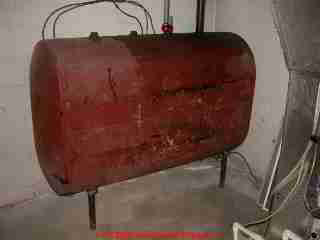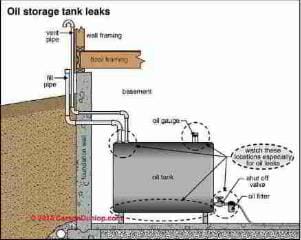 Oil Storage Tank Life Expectancy
Oil Storage Tank Life Expectancy
Life of ASTs & USTs,
Causes of Oil Tank Leaks, How to Maximize Oil Tank Life
- POST a QUESTION or COMMENT about typical oil storage tank life and factors that affect oil tank durability and leak risk
Heating oil storage tank life expectancy:
What is the typical life of above ground oil storage tanks and what factors influence that tank lifetime?
We describe the life range of an AST and what affects its service life then we continue with a discussion of the life of underground tanks.
This article series discusses the typical life of oil storage tanks such as tanks used to store No. 2 home heating oil.
Both above-ground oil storage tank life (AST life) and underground storage tank life (UST life) and the factors that determine the life of those tanks are explained.
In a discussion of maximizing oil storage tank life - that means minimizing the risk of an oil tank leak - we describe things that can shorten the life of an oil tank can be avoided or corrected.
The photo at page top shows how a leak develops and appears in an indoor oil storage tank, forming a stalactite of oil and sludge hanging from the bottom of the tank.
InspectAPedia tolerates no conflicts of interest. We have no relationship with advertisers, products, or services discussed at this website.
- Daniel Friedman, Publisher/Editor/Author - See WHO ARE WE?
Oil Storage Tank Life Expectancy, Causes of Leaks, Steps to Maximize Oil Tank Life
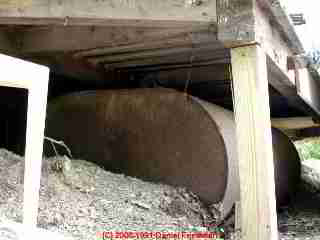 Beginning here with a discussion of above ground oil tank life (AST life) we cover both above ground oil tank life and next, buried oil tank life. We discuss the oil tank life expectancy factors for both ASTs and USTs.
Beginning here with a discussion of above ground oil tank life (AST life) we cover both above ground oil tank life and next, buried oil tank life. We discuss the oil tank life expectancy factors for both ASTs and USTs.
How long should an oil storage tank last & what are the main factors that affect oil storage tank life & leak risk?
Indoor Above Ground Oil Storage Tank Life Expectancy Factors. Outdoor Above Ground Oil Storage Tank Life Expectancy Factors.
Article Series Contents
- OIL TANK LIFE for ASTs and USTs - home page
- ABOVE-GROUND OIL TANK LIFE EXPECTANCY - discussed here
- FACTORS in AST OIL TANK LIFE - things to check to evaluate a specific oil storage tank
- INSPECTIONS PREDICT OIL TANK LIFE - visual clues
- SITE FACTORS AFFECT OIL TANK LIFE
- BURIED OIL TANK LIFE EXPECTANCY
- FACTORS in BURIED OIL TANK LIFE
- OIL TANK LIFE EXTENSION
This article discusses the typical life of oil storage tanks such as tanks used to store No. 2 home heating oil. Both above-ground oil storage tank life (AST life) and underground storage tank life (UST life) and the factors that determine the life of those tanks are explained.
In a discussion of maximizing oil storage tank life - that means minimizing the risk of an oil tank leak - we describe things that can shorten the life of an oil tank can be avoided or corrected. The photo at page top shows how a leak develops and appears in an indoor oil storage tank, forming a stalactite of oil and sludge hanging from the bottom of the tank.
[Click to enlarge any image]
Because a steel oil tank often rusts through from the inside out, the exterior of an oil tank may look fine but in fact it could be paper thin and easily punctured, even by a finger!
The life expectancy of oil tanks is helpful in planning for storage tank testing and storage tank replacement. This article series begins at OIL TANKS - topic home, and offers extensive free un-biased oil storage tank inspection and testing advice for property buyers and owners.
Life Expectancy of Above Ground Oil Storage Tanks - indoors or outside
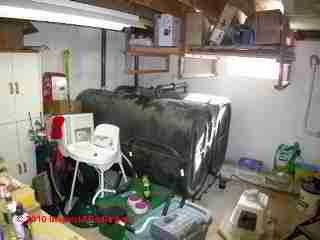 We find residential oil storage tanks having a typical life ranging from 20 years to 40 years or even longer.
We find residential oil storage tanks having a typical life ranging from 20 years to 40 years or even longer.
However as we discuss in this article series, the actual life expectancy of a specific oil storage tank depends on quite a few variables including not just its materials but how and where it is installed and on related factors like water leaks into the tank.
We suspect that there is a wide variation in indoor above ground and outdoor above ground oil tank life due to the considerable variation in both the quality and thickness of oil tank steel (older tanks seem to have been a heavier gauge steel), as well as other factors determining oil storage tank life.
We have seen indoor oil tanks easily in good condition that are 60 years old or older, and we have found failures in newer oil storage tanks that may have been made of thinner or cheaper steel and that did not last as long as the original ones.
[Click to enlarge any image]
A typical modern residential storage tank steel is 14-gauge (2.0mm) to 12 gauge (2.3mm) as shown in the oil storage tank data tag picture below. Some older residential oil tank walls may be thicker.
Table of Oil Tank Types, Properties, Wall Thickness, Life Expectancy |
||
| Indoor Oil Tank Material, Thickness | Indoor Oil Tank Life in Years |
Comments |
| Steel tank, 14-gauge (2.0mm) single wall | 15 | Oil line connects at tank end wall |
| Steel tank, 14-gauge (2.0mm) single wall | 20 | Oil line connects at tank bottom |
| Steel tank, 12-gauge (2.3mm) single wall | 20 | Oil line connects at tank end wall |
| Steel tank, 12-gauge (2.3mm) single wall | 25 | Oil line connects at tank bottom |
| Steel tank, 14-gauge (2.0mm) single walled upper, double-walled bottom | 50 | |
| Fiberglass or Plastic tank, single wall | 50 | |
| Fiberglass or Plastic tank, double-wall construction | 50 | |
...
| Outdoor Oil Above Ground Tank Material, Thickness | Outdoor Oil Tank Life in Years |
Comments |
| Steel tank, 14-gauge (2.0mm) single wall | 10 | Oil line connects at tank end wall |
| Steel tank, 14-gauge (2.0mm) single wall | 15 | Oil line connects at tank bottom |
| Steel tank, 12-gauge (2.3mm) single wall | 15 | Oil line connects at tank end wall |
| Steel tank, 12-gauge (2.3mm) single wall | 20 | Oil line connects at tank bottom |
| Steel tank, 14-gauge (2.0mm) single walled upper, double-walled bottom | 50 | |
| Fiberglass or Plastic tank, single wall | 50 | |
| Fiberglass or Plastic tank, double-wall construction | 50 |
Notes to the table above
Buried oil storage tank life data is given separately at BURIED OIL TANK LIFE EXPECTANCY
Fiberglass oil tanks refers to tanks constructed of 100% fiberglass and epoxy resin. Some fiberglass tanks are double-walled.
Plastic oil tanks refers to polyethylene oil storage tanks. Some polyethylene oil tanks include an external galvanized steel outer jacket, so don't assume that a steel exterior means that the tank is all steel.
Single wall tank with double bottom refers to oil storage tanks that typically include a leak detection system.
Data sources: seeReferences or Citations
Above Ground Oil Storage Tanks (ASTs) Life Expectancy Factors
 First let's define oil storage tank life as the service life of an oil tank, that is the tank is not leaking. When a steel oil tank is leaking (other than possibly at a plumbing or pipe connection), while there are some tricks or products that can extend the in-place use or tank life, the tank has, on its own, reached the end of its life.
First let's define oil storage tank life as the service life of an oil tank, that is the tank is not leaking. When a steel oil tank is leaking (other than possibly at a plumbing or pipe connection), while there are some tricks or products that can extend the in-place use or tank life, the tank has, on its own, reached the end of its life.
Next, before we discuss specific field conditions that affect the life of an oil tank, we note the following general factors that affect the oil tank's life expectancy:
- Oil tank design: single-wall vs. double wall
- Oil tank materials: steel, varying by thickness, fiberglass, plastic
- Oil tank location: above-ground indoors, above ground outdoors, buried oil tanks, and for buried oil tanks, also soil properties including corrosivity, installation damage, water
- Plumbing connections for oil fill, vent, or oil line piping and that strip threads or fail to seal can cause a leak that might be repairable.
In a companion article
BURIED OIL TANK LIFE EXPECTANCY
we report that 82% of oil tank leaks were at piping connections and that for buried tanks soil conditions were the second most-significant factor in tank life. - Mechanical damage to an oil tank can cause an immediate leak (vehicle impact) or can shorten the tank's life (steel tank coating damaged by banging on rocks during installation)
- Water entry into steel oil tanks reduces the life of tank. See OIL TANK WATER CONTAMINATION.
Inspections & Tests to Predict Oil Storage Tank Life
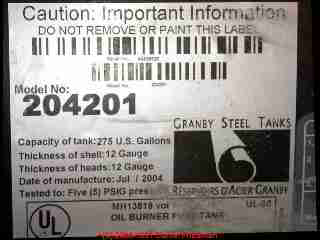 Rather than guess at oil tank condition, we suggest that if your home has an older above ground oil storage tank, ten years old or older, you should take the following steps to assess its actual condition:
Rather than guess at oil tank condition, we suggest that if your home has an older above ground oil storage tank, ten years old or older, you should take the following steps to assess its actual condition:
- Inspect heating oil fill & vent piping & oil distribution piping with great care - most oil tank system leaks appear to occur at piping connections.[3] Details are
at OIL TANK PIPING & PIPING DEFECTS. - Inspect the oil storage tanks themselves. Make a simple visual inspection of the oil tanks and piping for leaks; light external rust is not usually a problem - oil tanks usually corrode and leak from the inside, and usually in the bottom 1/4 of the tank; See these articles:
- OIL TANK DEFECT INSPECTION - how to examine or test an oil tanks for evidence of leaks or damage
- ABOVE GROUND OIL STORAGE TANK (AST) INSPECTION of Oil Storage Tanks for evidence of leaks, damage, improper piping - photos and text
- OIL TANK INSPECTION CHECKLIST, an Oil Company's advice
- If the oil tank is leaking, such in the photographs above, don't ignore it. The first tank shown here (above left) has seepage at its fill and vent fittings, a rather typical and trivial problem which is hard to avoid unless
meticulous sealant application is used during assembly of the fill and vent piping - the machining at the tank top and on larger diameter
piping is often a bit rough.
The second tank (above right) is an older oil tank which shows the same seepage around the tank top fittings.
But what about those oil stains on the lower left tank body? The tank may be leaking at its seams or from perforations. Further investigation is warranted.
See OIL TANK LEAKS & SMELLS - home: causes of leaks in oil tanks, oil tank testing alternatives, what to do about leaky tanks: D. J. Friedman, ASHI Tech. Journal, Vol.2 No.1, Winter, 1992 p. 42-43 Illus
- Have the oil tank steel tested for soundness -
See OIL TANK LEAK TEST METHODS - if the tank is not sound, have it replaced. - If there is evidence of water or sludge in the oil tank, ask your oil company to pump out sludge or water;
See OIL TANK WATER CONTAMINATION or OIL TANK SLUDGE. - If heating oil tank sludge has been clogging the heating equipment oil filters, double the oil filter size and quantity (install two filters in parallel) so that you can get from one annual heat service call to the next without a no-heat call due to clogged oil filter.
If sludge has clogged oil piping lines it may be possible to clean them but replacement is often necessary.
See OIL TANK SLUDGE. - If you have to install a new oil tank and there is not room to place a tank indoors, we recommend building a cover over the oil tank to protect it from weather and to permit heating the tank enclosure just enough to keep it above 35 degF.
We prefer to avoid outdoor tanks because of the risk loss of heat due to water, ice, or fuel waxing, OR because the owner has to pay more for heat by having to burn kerosene mix or add pour point depressants at each oil fill-up),
if you have to, to an outdoor tank, enclose it and give it a little heat is the best installation.
Thanks to reader Robert Frank for suggesting a discussion of indoor oil storage tank life.
Site-Factors in Indoor Above Ground Oil Storage Tank Life Expectancy
We discuss the inspection of above ground oil storage tanks in detail
at ABOVE GROUND OIL TANK (AST) GUIDE.
Sketch at left of leak points at an indoor oil storage tank is provided courtesy of Carson Dunlop Associates, a Toronto home inspection, education & report writing tool company [ carsondunlop.com ].
Here are trouble signs for ASTs:
- Visible oil seepage (see the seepage and leak notes discussed above at indoor oil tanks)
- Water accumulating inside the oil storage tank from bad oil deliveries or from wide temperature swings and in-tank condensation.
Test the tank for water and remove water from the oil tank by pumping (large amounts) or by absorbing chemicals or pads (small amounts of water). - Poorly-made or corroded or damaged plumbing connections or oil piping.
Inspect and correct any leaky fittings. Look for under-sized vent piping or both fill and vent piping that are smaller than 2" in nominal diameter.
- Defective oil storage tank welds
- Mechanical damage to oil storage tank fill & vent piping or to the oil tank where such piping connects, such as being struck by vehicles outside, causing bends or cracks where those pipes connect to the top of the oil storage tank (this can happen to both buried and above ground oil tanks)
Outdoor Above-ground Oil Storage Tank (AST) Life include the following:
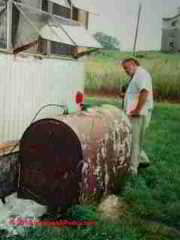
- Exposure of the oil storage tank to wider temperature swings, especially in cold and humid climates can increase in-tank condensation
- Exposure of the tank filler or vent pipes to rain, especially to roof runoff for tanks mounted under the eaves of a home and especially if a proper cap is not kept on the tank filler pipe or if the vent pipe is not properly installed and shielded.
- External oil tank rust due to exposure to the weather. Many small tanks, 250g or 275g, were never rated for outdoor use, as you may easily
ready by examining the embossed UL label affixed to most tanks.
Manufacturers of newer oil storage tanks in this size range appear to have removed this "indoor use only" wording from the UL label, as you can see in the photo shown here.
We have not learned whether the standard was changed, the tanks were changed, or simply the label was changed.
An outdoor tank should be protected from the weather and in freezing climates should be given shelter and warmth. - Improper oil tank installation / installation of improper oil tank type: two AST oil tank photos above shows an old, indoor-oil tank which was
moved outside and placed onto the soil surface below a deck, and then was half buried.
What is this tank, a buried tank or an above ground tank? It was not rated for outdoor use at all and is at extra risk of leakage due to placement of the tank body directly in contact with the soil. - Improper oil storage tank supports, such as failure to keep the outdoor tank off of the ground, to install it at the proper pitch and direction of pitch, and to install it on level, secure piers can lead to a tank tipping over, ripping open an oil line, and obvious catastrophes of oil spillage and heat loss.
The rate or frequency of oil tank leaks or oil storage tank failures, focused on underground storage tanks or USTs, is discussed in detail
at TANK FAILURE RATES Oil Tank Failure Data - Oil Tank Failure Rates, Oil Tank Leak Probability as a Function of Tank Age, Location, Condition, Soil Conditions and Other Factors.
TANK REGULATIONS outlines who, when, and how oil leaks and spills must be reported to environmental authorities.
Oil Tank Life Research
- RESIDENTIAL OIL TANK LIFE EXPECTANCY [PDF], retrieved 2017/09/06, Association Quebecoise des Independants du Petrole, Website: http://www.aquip-petrole.com/, original source: http://www.cmmtq.org/docs/Documents/Actalitesenbref/Guide-to-residential-heating-oil-tanks.pdf
- FUEL STORAGE TANK CORROSION STUDY [PDF] U.S. EPA report on gasoline and oil tank corrosion, James H. Pim, P.E., John M. Searing, Suffolk County DOHS, 15 Horseblock Place, Farmingville Long Island, NY 11728, November 1988, for the Office of Underground Storage Tanks, U.S. EPA. ATTN: David O'Brien.
The report presents a study of 500 underground storage tanks spanning 24 February 1987 and September 1 1988 and summarizes earlier reports on this same study.
Tank sizes ranged from 175 gallons to 50,000 gallons, and oil tank ages ranged from two years to 70 years old.
All 500 oil storage tanks were constructed of welded steel, and 12 other tanks that were other than plain steel were also examined. Summary [with minor edits for clarity by DJF] - Also see more atReferences or Citations
...
Reader Comments, Questions & Answers About The Article Above
Below you will find questions and answers previously posted on this page at its page bottom reader comment box.
Reader Q&A - also see RECOMMENDED ARTICLES & FAQs
On 2020-07- by (mod) - Is copper piping allowed for the fill and vent pipes
Richard:
Copper piping is permitted by typical standards and codes for heating or fuel oil piping provided it's a listed and proper type. See the table excerpted from the 2008 ICC Chapter 13 on Oil Tank Piping [PDF] given as a live link in
OIL FILL & VENT PIPING
On 2020-07-12 by Richard
Is copper piping allowed for the fill and vent pipes on a 257 gallon oil tank located in a basement ?
On 2020-06-01 - by (mod) -
Joyce
Sure, an old oil tank can and usually should be removed. If instead you want to sand, clean, and paint it, provided cleaning to prepare for painting isn't going to encounter such bad rust that you get a leak, that's fine. You'd use an oil or alkyd based primer and paint.
On 2020-06-01 by Joycehayduchok@comcast.net
It is an above ground oil tank but is rusty. Not sure it is being used since we bought the house. Built before 1978
On 2020-06-01 by Joycehayduchok@comcast.net
We have an InBide Tank for Oil Burner No. P-239079
Shows Underwriter Laboratories Inc. Highland Tank Co.
We bought house in DE. It uses baseboard heat and Propane.
Can this old tank able to be removed? Can it be painted?
On 2020-05-16 - by (mod) -
does the label tell when an oil tank expires? Kim
Kim
Thank you for asking. So is there an expiration date on or for heating oil storage tanks?
Not exactly.
We can see that your tank, a double-bottom unit intended for storage of heating oil, was produced in 2017.
I have not seen an on-tank stamp or data indicating an expiration date for heating oil oil storage tanks.
If properly-installed and un-damaged, and properly maintained (periodic inspection, remove water, check for damage) a typical modern steel oil storage tank has a 15-20 year life expectancy. There is some variation in that life depending on manufacturer, tank model, tank materials.
You **will** however find expiration dates on LNG or propane storage tanks.
On 2020-05-16 by Kim
Can you tell by the tag when this tank expires?
On 2019-02-17 - by (mod) -
John
Possibly but more-likely there are issues with contamination rather than deterioration, or with mal-adjustment of the oil burner or its igniter or transformer assembly.
On 2019-02-17 by John
Can fuel degrade to a point where it will still burn but will not ignite when the furnace kicks on. The electrodes are producing an arc but fuel doesn't ignite. With a tissue and a match, it ignites and runs a full heat cycle. Will not ignite on next call for heat.
On 2019-02-06 16 - by (mod) -
Maggie
To have space for a thorough reply to my "yes" answer to your question please see WATER ENTRY FROM BURIED TANKS
https://inspectapedia.com/Wet_Basements/Buried-Tanks-Basement-Water.php
and post further comments or questions there.
On 2019-02-06 by Maggie
I have an underground oil tank, not used for 30 years. I didn’t know it was there when I bought the house. It is buried in the driveway. I leak in the basement has been going on for a few years. Now that I know the tank is on the other side of the wall. Is the tank causing the leak in the basement? Thank you
On 2018-12-15 by bob
the # on the plate is h732688 no12
...
Continue reading at OIL TANK LIFE EXTENSION or select a topic from the closely-related articles below, or see the complete ARTICLE INDEX.
Or see OIL TANK LIFE, ABOVEGROUND FAQs - questions & answers about the life expectancy of oil tanks, posted originally on this page.
Or see these
Recommended Articles
- OIL TANK LIFE for ASTs and USTs
- OIL TANK LEAKS & SMELLS - home
- OIL TANK PRESSURE
- OIL TANK TESTING & REMOVAL COs
- OIL TANK WATER CONTAMINATION
Suggested citation for this web page
OIL TANK LIFE, ABOVEGROUND at InspectApedia.com - online encyclopedia of building & environmental inspection, testing, diagnosis, repair, & problem prevention advice.
Or see this
INDEX to RELATED ARTICLES: ARTICLE INDEX to HEATING OIL, OIL BURNERS, OIL FIRED HEATERS, OIL TANKS
Or use the SEARCH BOX found below to Ask a Question or Search InspectApedia
Ask a Question or Search InspectApedia
Questions & answers or comments about oil storage tank life expectancy.
Try the search box just below, or if you prefer, post a question or comment in the Comments box below and we will respond promptly.
Search the InspectApedia website
Note: appearance of your Comment below may be delayed: if your comment contains an image, photograph, web link, or text that looks to the software as if it might be a web link, your posting will appear after it has been approved by a moderator. Apologies for the delay.
Only one image can be added per comment but you can post as many comments, and therefore images, as you like.
You will not receive a notification when a response to your question has been posted.
Please bookmark this page to make it easy for you to check back for our response.
IF above you see "Comment Form is loading comments..." then COMMENT BOX - countable.ca / bawkbox.com IS NOT WORKING.
In any case you are welcome to send an email directly to us at InspectApedia.com at editor@inspectApedia.com
We'll reply to you directly. Please help us help you by noting, in your email, the URL of the InspectApedia page where you wanted to comment.
Citations & References
In addition to any citations in the article above, a full list is available on request.
- Thanks to Robert Frank for email discussion about oil storage tank life, 1/21/2010
- [1] Fuel Storage] Tank Corrosion Study, U.S. EPA report on gasoline and oil tank corrosion, James H. Pim, P.E., John M. Searing, Suffolk County DOHS, 15 Horseblock Place, Farmingville Long Island, NY 11728, November 1988, for the Office of Underground Storage Tanks, U.S. EPA. ATTN: David O'Brien. The report presents a study of 500 underground storage tanks spanning 24 February 1987 and September 1 1988 and summarizes earlier reports on this same study. Tank sizes ranged from 175 gallons to 50,000 gallons, and oil tank ages ranged from two years to 70 years old. All 500 oil storage tanks were constructed of welded steel, and 12 other tanks that were other than plain steel were also examined. Summary [with minor edits for clarity by DJF]
- [3] "A Case Study of a Large Scale Precision [oil or fuel] Tank Testing Program", Diane H. Heck, Tetra Tech Richardson, Newark, Delaware, web search 4/27/12, original source: http://info.ngwa.org/GWOL/pdf/870143411.PDF, copy on file as /heating/OIl Tanks UST/Tank_Test_Heck_870143411.pdf
- [4] Fuel Oil and Oil Heat Magazine, August 1985 p.18. Fuel Oil & Oil Heating Magazine, 3621 Hill Rd., Parsippany, NJ 07054, 973-331-9545
- [5] Standards of the National Board of Fire Underwriters, as referenced by "Domestic and Commercial Oil Burners,", Charles H. Burkhardt, 1961, 3rd Ed., McGraw Hill Book Company, p. 172
- [6] NFPA - the National Fire Protection Association can be found online at www.nfpa.org
- [7] "The Interim Prohibition Guidance for Design and Installation of Underground Oil Storage Tanks", U.S. EPA, EPA/530-SW-85203, Office of Underground Storage Tanks, Washington D.C.
- [9] US EPA "How do you Properly Close a UST?" is summarized at epa.gov/OUST/fsprevnt.htm These details for temporary and permanent closing of underground oil storage tanks are provided by the US EPA as well.
- [10] "How do you choose the right tank testing method?", Cynthia Johnson, Fuel Oil & Oil Heat Magazine, November 1995
- [11] National Association of Oil Heat Service Managers, PO Box 380, Elmwood Park, NJ 07407
- [12] "Homeowners Guide to Fuel Storage," Agway Energy Products, Verbank, NY, November 1990
- [13] "Causes of Underground Corrosion", Harco Corporation, Paper HC-36, Median OH
- Residential Oil Tank Life Expectancy, [PDF], retrieved 2017/09/06, Association Quebecoise des Independants du Petrole, Website: http://www.aquip-petrole.com/, original source: http://www.cmmtq.org/docs/Documents/Actalitesenbref/Guide-to-residential-heating-oil-tanks.pdf
- In addition to citations & references found in this article, see the research citations given at the end of the related articles found at our suggested
CONTINUE READING or RECOMMENDED ARTICLES.
- Carson, Dunlop & Associates Ltd., 120 Carlton Street Suite 407, Toronto ON M5A 4K2. Tel: (416) 964-9415 1-800-268-7070 Email: info@carsondunlop.com. Alan Carson is a past president of ASHI, the American Society of Home Inspectors.
Thanks to Alan Carson and Bob Dunlop, for permission for InspectAPedia to use text excerpts from The HOME REFERENCE BOOK - the Encyclopedia of Homes and to use illustrations from The ILLUSTRATED HOME .
Carson Dunlop Associates provides extensive home inspection education and report writing material. In gratitude we provide links to tsome Carson Dunlop Associates products and services.


